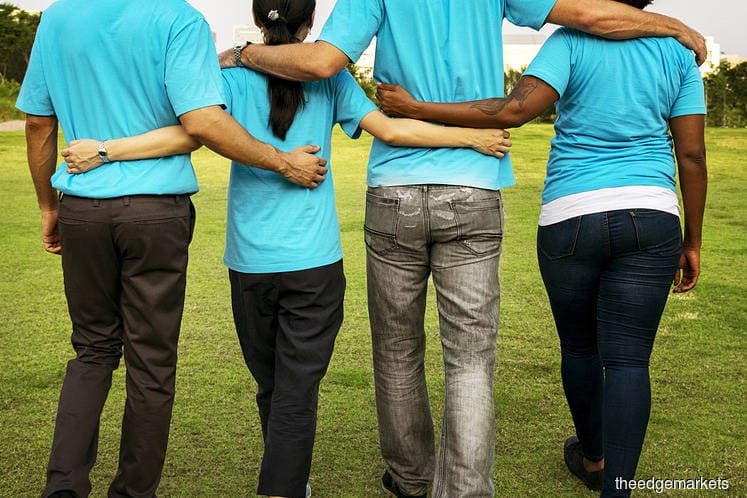
This article first appeared in Personal Wealth, The Edge Malaysia Weekly on July 15, 2019 - July 21, 2019
The world is witnessing the highest levels of displacement on record. According to the United Nations High Commissioner for Refugees (UNHCR), nearly 25.8 million of the 70.8 million people who have been displaced are refugees, more than half of whom are under the age of 18.
To provide urgent assistance to these refugees in need, UNHCR has launched the Refugee Zakat Fund — a global fund that allows Muslims to fulfil their zakat obligations. Launched in April, the fund ensures that 100% of the contributions are delivered directly to the most vulnerable refugees and internally displaced families, focusing on those comprising widows, orphans and the elderly.
According to UNHCR’s Islamic philanthropy officer Shadi Ghrawi, the fund’s structure is built on the organisation’s experience with zakat since the end of 2016. At the time, the organisation was looking for ways to leverage Islamic philanthropy to bridge the gap in funding for refugees.
“One of the recommendations given at the 2016 World Humanitarian Summit was for humanitarian communities to seriously consider leveraging zakat and sadaqah as types of charities, especially given that the majority of the people being served by the communities are Muslims. There are a lot of obvious synergies that the humanitarian communities can actually build on. Taking this into account, we sought fatwas (a ruling on a point of Islamic law given by a recognised authority) that would help UNHCR to govern the process of receiving and distributing zakat funds,” says Ghrawi.
By end-2016, the organisation had received fatwas from five prominent scholars and institutions mainly based in the Middle East and North Africa region. According to the fatwas, UNHCR could receive and distribute zakat funds under two main conditions — the beneficiaries had to fall within one of the eight categories of zakat recipients and UNHCR should not deduct any fees or wages from the zakat funding it receives.
“This means that we are waiving the standard 7% overhead cost applied to any donations we normally receive,” says Ghrawi.
The Refugee Zakat Fund is a restructuring of UNHCR’s previous pilot zakat programme, which ran from 2016 to 2018. During that period, the organisation received about US$14.4 million, which was used to support 6,888 displaced families consisting primarily of Syrian refugees in Jordan and Lebanon, says Ghrawi.
This year, the fund has expanded its reach to eligible refugees and displaced families from Syria, Iraq, Yemen and Mali. The organisation aims to further expand the reach of the fund to include other eligible refugees in internally displaced crises such as Somalis in the near future.
Ghrawi explains that the zakat fund will support UNHCR’s cash assistance programme, which enables beneficiaries to afford the most basic needs such as shelter, food and water. Closely monitored by UNHCR teams on the ground, this cash assistance allows refugee families to keep living their daily lives with dignity and freedom to choose what they need most on a day-to-day basis.
“Most of the families that we target with our cash assistance programmes are refugees who have lost their savings and do not have jobs. Most of the countries they are currently residing in do not allow refugees to work, so it is extremely difficult for them to make a living. Until there is a more sustainable solution in place, cash assistance — including zakat — provides them with good social welfare protection,” says Ghrawi.
The aim of the Refugee Zakat Fund is to help refugees help themselves, he adds. From many years of experience administering the cash assistance programme, the organisation knows that recipient refugees consistently spend the money on their daily survival. “Most vulnerable families remain supported by our cash programme until UNHCR helps them become self-reliant or finds them other durable solutions,” says Ghrawi.
On top of preparing the platform, the organisation also publishes post-distribution reports, especially for donors who give a sizeable zakat donation, he says. The report entails how the fund is distributed and how many families have benefited from the money, among others.
In many Muslim countries, the collection of zakat is institutionalised. The promotion, collection and distribution of zakat are undertaken by the respective religious authorities according to shariah requirements.
Fully understanding this, UNHCR is very interested to work with the relevant zakat institutions to support refugees with zakat. “The fund was just launched, so we are still at the building stage. But we do want to work with zakat institutions around the globe to broaden the reach,” says Ghrawi.
Non-Muslims who are interested in contributing towards the aid of refugees around the world can do so directly to UNHCR under its standard donation drive. Local donors can also contribute to UNHCR Malaysia to support refugees based in the country.
Save by subscribing to us for your print and/or digital copy.
P/S: The Edge is also available on Apple's AppStore and Androids' Google Play.